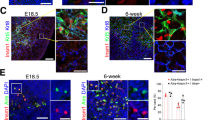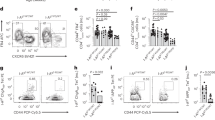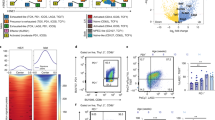Abstract
Autoimmune polyendocrinopathy syndrome type 1 is a recessive Mendelian disorder resulting from mutations in a novel gene, AIRE, and is characterized by a spectrum of organ-specific autoimmune diseases. It is not known what tolerance mechanisms are defective as a result of AIRE mutation. By tracing the fate of autoreactive CD4+ T cells with high affinity for a pancreatic antigen in transgenic mice with an Aire mutation, we show here that Aire deficiency causes almost complete failure to delete the organ-specific cells in the thymus. These results indicate that autoimmune polyendocrinopathy syndrome 1 is caused by failure of a specialized mechanism for deleting forbidden T cell clones, establishing a central role for this tolerance mechanism.
This is a preview of subscription content, access via your institution
Access options
Subscribe to this journal
Receive 12 print issues and online access
$209.00 per year
only $17.42 per issue
Buy this article
- Purchase on Springer Link
- Instant access to full article PDF
Prices may be subject to local taxes which are calculated during checkout



Similar content being viewed by others
References
Ohashi, P.S. et al. Ablation of “tolerance” and induction of diabetes by virus infection in viral antigen transgenic mice. Cell 65, 305–317 (1991).
Katz, J.D., Wang, B., Haskins, K., Benoist, C. & Mathis, D. Following a diabetogenic T cell from genesis through pathogenesis. Cell 74, 1089–1100 (1993).
Goverman, J. Tolerance and autoimmunity in TCR transgenic mice specific for myelin basic protein. Immunol. Rev. 169, 147–159 (1999).
Scott, B. et al. A role for non-MHC genetic polymorphism in susceptibility to spontaneous autoimmunity. Immunity 1, 73–83 (1994).
Lafaille, J.J., Nagashima, K., Katsuki, M. & Tonegawa, S. High incidence of spontaneous autoimmune encephalomyelitis in immunodeficient anti-myelin basic protein T cell receptor transgenic mice. Cell 78, 399–408 (1994).
Waldner, H., Whitters, M.J., Sobel, R.A., Collins, M. & Kuchroo, V.K. Fulminant spontaneous autoimmunity of the central nervous system in mice transgenic for the myelin proteolipid protein-specific T cell receptor. Proc. Natl. Acad. Sci. USA 97, 3412–3417 (2000).
Hernandez, J., Aung, S., Redmond, W.L. & Sherman, L.A. Phenotypic and functional analysis of CD8(+) T cells undergoing peripheral deletion in response to cross-presentation of self-antigen. J. Exp. Med. 194, 707–717 (2001).
Lambolez, F., Jooss, K., Vasseur, F. & Sarukhan, A. Tolerance induction to self antigens by peripheral dendritic cells. Eur. J. Immunol. 32, 2588–2597 (2002).
Greenwald, R.J., Boussiotis, V.A., Lorsbach, R.B., Abbas, A.K. & Sharpe, A.H. CTLA-4 regulates induction of anergy in vivo. Immunity 14, 145–155 (2001).
Shevach, E. CD4+CD25+ suppressor T cells: more questions than answers. Nat. Rev. Immunol. 2, 389–400 (2002).
Le Douarin, N. et al. Evidence for a thymus-dependent form of tolerance that is not based on elimination or anergy of reactive T cells. Immunol. Rev. 149, 35–53 (1996).
Hammerling, G.J. et al. Non-deletional mechanisms of peripheral and central tolerance: studies with transgenic mice with tissue-specific expression of a foreign MHC class I antigen. Immunol. Rev. 122, 47–67 (1991).
Hoffmann, M.W., Heath, W.R., Ruschmeyer, D. & Miller, J.F. Deletion of high-avidity T cells by thymic epithelium. Proc. Natl. Acad. Sci. USA 92, 9851–9855 (1995).
Akkaraju, S. et al. A range of CD4 T cell tolerance: partial inactivation to organ-specific antigen allows nondestructive thyroiditis or insulitis. Immunity 7, 255–271 (1997).
Klein, L., Klein, T., Ruther, U. & Kyewski, B. CD4 T cell tolerance to human C-reactive protein, an inducible serum protein, is mediated by medullary thymic epithelium. J. Exp. Med. 188, 5–16 (1998).
Jolicoeur, C., Hanahan, D. & Smith, K.M. T-cell tolerance toward a transgenic β-cell antigen and transcription of endogenous pancreatic genes in thymus. Proc. Natl. Acad. Sci. USA 91, 6707–6711 (1994).
Kyewski, B., Derbinski, J., Gotter, J. & Klein, L. Promiscuous gene expression and central T-cell tolerance: more than meets the eye. Trends Immunol. 23, 364–371 (2002).
Betterle, C., Greggio, N.A. & Volpato, M. Clinical review 93: autoimmune polyglandular syndrome type 1. J. Clin. Endocrinol. Metab. 83, 1049–1055 (1998).
Nagamine, K. et al. Positional cloning of the APECED gene. Nat. Genet. 17, 393–398 (1997).
The Finnish-German APECED Consortium. An autoimmune disease, APECED, caused by mutations in a novel gene featuring two PHD-type zinc-finger domains. Nat. Genet. 17, 399–403 (1997).
Pitkanen, J. et al. The autoimmune regulator protein has transcriptional transactivating properties and interacts with the common coactivator CREB-binding protein. J. Biol. Chem. 275, 16802–16809 (2000).
Bjorses, P. et al. Mutations in the AIRE gene: effects on subcellular location and transactivation function of the autoimmune polyendocrinopathy-candidiasis-ectodermal dystrophy protein. Am. J. Hum. Genet. 66, 378–392 (2000).
Ramsey, C. et al. Aire deficient mice develop multiple features of APECED phenotype and show altered immune response. Hum. Mol. Genet. 11, 397–409 (2002).
Heino, M. et al. Autoimmune regulator is expressed in the cells regulating immune tolerance in thymus medulla. Biochem. Biophys. Res. Commun. 257, 821–825 (1999).
Bjorses, P. et al. Localization of the APECED protein in distinct nuclear structures. Hum. Mol. Genet. 8, 259–266 (1999).
Anderson, M.S. et al. Projection of an immunological self-shadow within the thymus by the Aire protein. Science 298, 1395–1401 (2002).
Lesage, S. et al. Failure to censor forbidden clone of CD4 T cells in autoimmune diabetes. J. Exp. Med. 196, 1175–1188 (2002).
Ho, W.Y., Cooke, M.P., Goodnow, C.C. & Davis, M.M. Resting and anergic B cells are defective in CD28-dependent costimulation of naive CD4+ T cells. J. Exp. Med. 179, 1539–1549 (1994).
Adelstein, S. et al. Induction of self-tolerance in T cells but not B cells of transgenic mice expressing little self antigen. Science 251, 1223–1225 (1991).
Akkaraju, S., Canaan, K. & Goodnow, C.C. Self-reactive B cells are not eliminated or inactivated by autoantigen expressed on thyroid epithelial cells. J. Exp. Med. 186, 2005–2012 (1997).
Van Parijs, L., Peterson, D.A. & Abbas, A.K. The Fas/Fas ligand pathway and Bcl-2 regulate T cell responses to model self and foreign antigens. Immunity 8, 265–274 (1998).
Ueno, T. et al. Role for CCR7 ligands in the emigration of newly generated T lymphocytes from the neonatal thymus. Immunity 16, 205–218 (2002).
Jordan, M.S. et al. Thymic selection of CD4+CD25+ regulatory T cells induced by an agonist self-peptide. Nat. Immunol. 2, 301–306 (2001).
Mason, D. Some quantitative aspects of T-cell repertoire selection: the requirement for regulatory T cells. Immunol. Rev. 182, 80–88 (2001).
Sakaguchi, S. Regulatory T cells: key controllers of immunologic self-tolerance. Cell 101, 455–458 (2000).
Heino, M. et al. RNA and protein expression of the murine autoimmune regulator gene (Aire) in normal, RelB-deficient and in NOD mouse. Eur. J. Immunol. 30, 1884–1893 (2000).
Stockinger, B. T lymphocyte tolerance: from thymic deletion to peripheral control mechanisms. Adv. Immunol. 71, 229–265 (1999).
Hanahan, D. Peripheral-antigen-expressing cells in thymic medulla: factors in self-tolerance and autoimmunity. Curr. Opin. Immunol. 10, 656–662 (1998).
Schwartz, R.H. T cell anergy. Annu. Rev. Immunol. 21, 305–334 (2003).
Jooss, K., Gjata, B., Danos, O., von Boehmer, H. & Sarukhan, A. Regulatory function of in vivo anergized CD4(+) T cells. Proc. Natl. Acad. Sci. USA 98, 8738–8743 (2001).
Vendetti, S. et al. Anergic T cells inhibit the antigen-presenting function of dendritic cells. J. Immunol. 165, 1175–1181 (2000).
Taams, L.S. et al. Anergic T cells actively suppress T cell responses via the antigen-presenting cell. Eur. J. Immunol. 28, 2902–2912 (1998).
Lombardi, G., Sidhu, S., Batchelor, R. & Lechler, R. Anergic T cells as suppressor cells in vitro. Science 264, 1587–1589 (1994).
Sakaguchi, S. et al. Immunologic tolerance maintained by CD25+ CD4+ regulatory T cells: their common role in controlling autoimmunity, tumor immunity, and transplantation tolerance. Immunol. Rev. 182, 18–32 (2001).
Vafiadis, P. et al. Insulin expression in human thymus is modulated by INS VNTR alleles at the IDDM2 locus. Nat. Genet. 15, 289–292 (1997).
Pugliese, A. et al. The insulin gene is transcribed in the human thymus and transcription levels correlated with allelic variation at the INS VNTR-IDDM2 susceptibility locus for type 1 diabetes. Nat. Genet. 15, 293–297 (1997).
Kishimoto, H. & Sprent, J. A defect in central tolerance in NOD mice. Nat. Immunol. 2, 1025–1031 (2001).
Klein, L., Klugmann, M., Nave, K.A., Tuohy, V.K. & Kyewski, B. Shaping of the autoreactive T-cell repertoire by a splice variant of self protein expressed in thymic epithelial cells. Nat. Med. 6, 56–61 (2000).
Anderson, A.C. et al. High frequency of autoreactive myelin proteolipid protein-specific T cells in the periphery of naive mice: mechanisms of selection of the self-reactive repertoire. J. Exp. Med. 191, 761–770 (2000).
Reif, K. et al. Balanced responsiveness to chemoattractants from adjacent zones determines B-cell position. Nature 416, 94–99 (2002).
Acknowledgements
We thank D. Gray and R. Boyd for thymic HEL measurement; J. Cyster, E. Unanue and D. Peterson for staining reagents; the staff of Medical Genome Centre for curating the mouse colony; and A. Murtagh, S. Ewing and S. Ward for genotyping. This work was supported by a grant from the Juvenile Diabetes Research Foundation and NHMRC.
Author information
Authors and Affiliations
Corresponding author
Ethics declarations
Competing interests
The authors declare no competing financial interests.
Supplementary information
Rights and permissions
About this article
Cite this article
Liston, A., Lesage, S., Wilson, J. et al. Aire regulates negative selection of organ-specific T cells. Nat Immunol 4, 350–354 (2003). https://doi.org/10.1038/ni906
Received:
Accepted:
Published:
Issue Date:
DOI: https://doi.org/10.1038/ni906
This article is cited by
-
The emerging family of RORγt+ antigen-presenting cells
Nature Reviews Immunology (2024)
-
Antibodies in action: the role of humoral immunity in the fight against atherosclerosis
Immunity & Ageing (2022)
-
Mesenchymal stromal cells in the thymus
Inflammation and Regeneration (2022)
-
Extrathymic expression of Aire controls the induction of effective TH17 cell-mediated immune response to Candida albicans
Nature Immunology (2022)
-
Recirculating Foxp3+ regulatory T cells are restimulated in the thymus under Aire control
Cellular and Molecular Life Sciences (2022)



